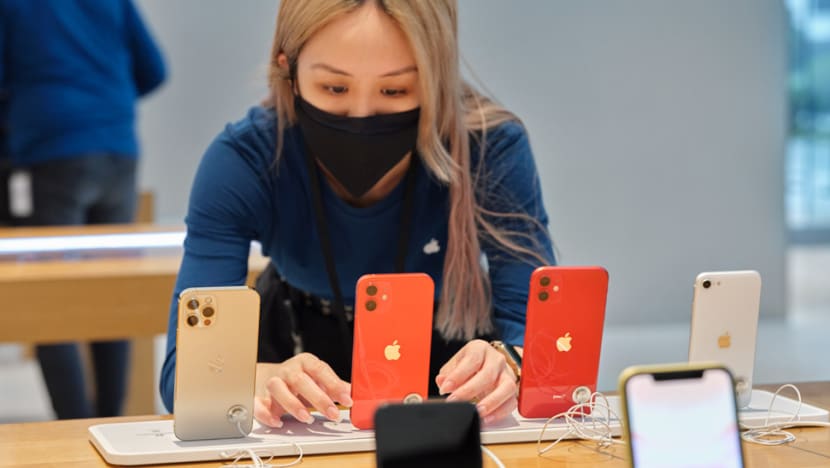Singapore agencies say strict safety requirements in place amid France's iPhone 12 radiation concerns

In this photo published by Apple on its website on Oct 23, 2020, an employee inspects iPhone 12 handsets at the Apple Store on Orchard Road in Singapore. (Photo: Apple)
SINGAPORE: Singapore is monitoring developments in the wake of a French regulator's warning that the iPhone 12 emits electromagnetic radiation levels that are above European Union standards for exposure.
France's National Frequency Agency (ANFR), which oversees radio-electric frequencies, on Sep 12 ordered Apple to stop selling the iPhone 12 and to fix existing handsets.
But the US tech giant disputed the findings and said the device complies with regulations.
Singapore's Infocomm Media Development Authority (IMDA) and the National Environment Agency (NEA) said on Friday (Sep 22) that before any radiofrequency (RF) emitting equipment such as an iPhone is approved for use here, it must meet strict safety requirements.
The iPhone 12 went on sale in Singapore in late 2020.
IMDA and NEA said Apple had submitted the RF test report for the phone model, showing it complied with prevailing international standards, including the EU standards, when the phone was first registered and subsequently approved for sale in Singapore.
IMDA has contacted Apple regarding the French findings.
"IMDA is in touch with Apple Singapore and understands from Apple that its iPhone 12 is certified by multiple international bodies and recognised as compliant with all applicable Specific Absorption Rate (SAR) regulations and standards globally," IMDA and NEA said in response to CNA's query.
"NEA and IMDA would like to assure the public that strict safety requirements are in place prior to the approving of any RF emitting equipment in Singapore. We will monitor any further developments in this case."
Related:
According to the NEA website, Singapore takes guidance on RF radiation from standards by the International Commission on Non-Ionising Radiation Protection (ICNIRP).
"The ICNIRP is an independent international organisation formally recognised by the World Health Organization," NEA said.
"It provides scientific advice and guidance on the health and environmental effects of non-ionising radiation. Its guidelines are widely accepted by many countries."
The agencies said all models of mobile phones will need to declare their conformance to Singapore Telecommunication Standards before they can be sold here. "The equipment vendor will submit their test reports done by accredited, certified test labs as proof of conformity," they added.
The Associated Press reported last week that ANFR found a level of electromagnetic energy absorption of 5.74 watts per kilogram during tests of an iPhone 12 in a hand or a pocket, higher than the EU standard of 4.0 watts per kilogram.
The agency said that the iPhone 12 did, however, meet the threshold when radiation levels were assessed for a phone kept in a jacket or in a bag.
Although Apple contested the findings, saying the iPhone 12 was certified by multiple international bodies as compliant with global standards, it agreed to issue a software update to accommodate the testing methods used in France.














